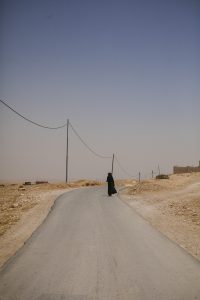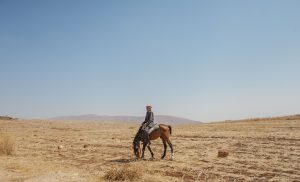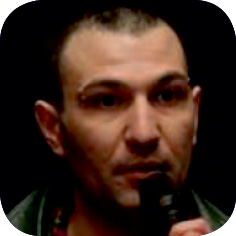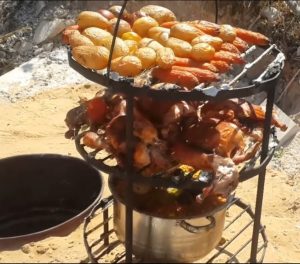The sinuous curves of the Palestinian deserts delicately welcome the awakening eyes, still dazed from sleep, which with astonishment linger on admiring these lands rich in history and yet so contentious.
“History connects us all.” I must have read that somewhere.
Along the curves of the long rural paths, veiled women, shepherds with their flocks, and children on camels or donkeys appear, offering a harmonious composition for the eye and the camera.
The arid summer earth leads your soul to painful introspection. The corporal detachment of the winter cold is lacking, the warmth of the air pushes you towards the earth, and during the journey it finds evidence in the human warmth of the Palestinians.
I woke up in the desert near Beit Sahour and Beit Jala – Wadi al-Rais is the name if I am not mistaken, in the Bethlehem district, between the buzzing of flies and the bites of mosquitoes. The night before, some local friends had cooked meat and vegetables using a zarb, a deep and fairly wide hole in the earth. Circular barbeque mini-grills laden with food are placed in the hole which contains wood that has been burned and turned into hot coals. The hole is then covered for a couple of hours to allow the food to cook.
We ate really late that night, I would say past midnight.
That evening, Abu Zaki, a nearly thirty-year-old father of two from Beit Sahour, looking younger than his real age, had put on a great show, telling stories in English and alternating with long comments in Arabic followed by roaring laughter.
Abu Zaki reminded me of one of the many Neapolitan street urchins. And I must admit that walking in the streets of Ramallah among the locals playing football and the women with frosted hair that is still in fashion here bear a striking resemblance to the lively Spanish quarters in Naples (Southern Italy). Abu Zaki’s hyperactive way of behaving and his self-confident and aggressive control of the “stage” revealed his histrionic and tender character at the same time. It is thanks to Abu Zaki that I understood that arba in Arabic does not mean “three” but “four,” and it was the same Abu Zaki who that night gave me the Palestinian name “Mahmoud,” which made me glad and proud. In my previous volunteer work in Gulu, Northern Uganda, I was given the Acholi name Omara – the one who is loved. Pretty exciting to receive a different name for each deployment.
True, the name Mahmoud might not sound very original, but it’s doubtless still an important name. Even now in certain circles in Palestine I am known as Mahmoud.

The zarb was delicious, and so was Umm Omar’s shawarma in Salfit. This thick meat ragù in a long bun really reminded me of our Ragù alla Genovese – which, despite the name, seems to have been born in Naples thanks to chefs from Genova.
The boys from Salfit Youth Council had taken us on a tour around the small but delightful old town of Salfit, about 50 kilometers northwest of Ramallah. Despite being unfortunately not very well kept, the location has its own intense charm, and our guides Amro and his friends were able to show us their site-revaluation interventions while they talked about their insightful plans for the future.
At the end of the day, among the celebrations for the fresh university graduates and the many fireworks to celebrate the various marriages around the town, we were warmly welcomed by Mama Omar, the owner of a very small but cozy food place, who took care of our stomachs for dinner. If you go to Salfit or even just plan to drive through it, you should definitely stop to enjoy her homemade cooking.
One starts to understand Mahmoud Darwish’s verse in depth: “We have on this land that which makes life worth living.” An earth whose landscape is being continuously contested and altered, its paths reshaped to never meet again, dismantled in its originality for a capricious vice of belonging. Unwilling travelers, whose suitcases now rest beside signposts that indicate military zones or natural reserves, are living testimonies that “exile is more than a geographical concept. You can be an exile in your homeland, in your own house, in a room.” (Mahmoud Darwish)

“The act of naming is the great and solemn consolation of mankind,” Elias Canetti once spelled out. In these three months, I have met many people of heart, strong but tender, determined but flexible, burdened but jovial.
A few days after the experience with Mama Omar, as I was returning home from Jerusalem, I crossed the Qalandia checkpoint on foot with a Catalan friend. While leaving the bus that had brought us from East Jerusalem, a middle-aged man with a few heavy shopping bags asked me in Arabic to help him carry them to the other side. I understood the question immediately, but I hesitated for security reasons. Like when I was a child, my mother used to say, “Don’t accept candy from strangers.”
What am I supposed to do now? I asked myself.
Frightened by my own thought and my hesitation, I finally accepted with a smile. In the short walk, he asked us in English about our country of origin and commented on our answers in Arabic, to which I replied by putting together all the Arabic words I knew:
“Filastina jamila kteer…Alfilastiniu shaeb latif.” (“Palestine is very beautiful…its people are nice.”)
Meanwhile, I could see what was in the bag he had given me – grapes, potatoes, plums, broad beans.
“Welcome to Palestine,” he repeated with a captivating smile.
A moment later an Israeli policeman shouted aggressively at a Palestinian driver in the background. We didn’t understand the reason, if there was one. He was so aggressive that four of his colleagues tried to stop him by pushing him away from the car.
“Welcome to Palestine” acquires a different meaning and tone depending on the situation.
We reached the closed tunnel; we could hear the newly installed lounge music from the “departures hall” in the background. We crossed through the turnstiles and exited onto the wide square in front of checkpoint, or “crossing,” as it is called by Israelis. The man asked us to leave the bag there. He would wait for a relative to pick him up and bring him home.
We said goodbye, but he asked us to wait a moment longer. He turned and took something from one of the bags. A few moments later, he handed us two bunches of grapes.
“Welcome to Palestine.”
“Shukran kteer,” we replied.
“Ma’assalaama.”
“Ma’assalaama.”



